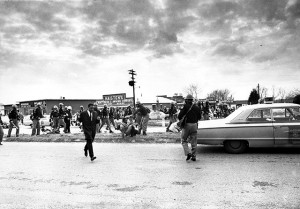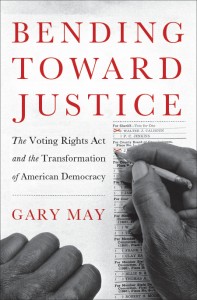On March 7, 1965, a group of about 600 people marched from Selma, Ala., to the state’s capital, Montgomery, to advocate for voting rights for African-Americans. The march devolved into violence when state and local police attacked the protesters after they crossed the Edmund Pettus Bridge, in what became known as Bloody Sunday. The event helped inspire President Lyndon Johnson and other politicians to champion voting rights legislation. In his book, Bending Toward Justice, Gary May follows how the civil rights movement lead to the Voting Rights Act, a law designed to protect the electoral rights of those who would challenge those in power — rights that are once again being threatened today.
It is merciful, perhaps, that so many in the nonviolent army assaulted on the Edmund Pettus Bridge in 1965 did not live to see their cause threatened once again. Hosea Williams, winner of the coin toss that brought him to the confrontation with Major Cloud, died from cancer in 2000. Albert Turner, the movement’s leader in Perry County, died of heart failure that same year. Marie Foster, whose clinics had prepared would-be voters for registration, died in 2003. Pancreatic cancer killed Jim Bevel in 2008, one year after his conviction on incest charges overshadowed all the good he had done as architect of the Birmingham and Selma campaigns.
Amelia Platts Boynton Robinson lived to celebrate her 101st birthday, but an association with political extremist Lyndon LaRouche tarnished her reputation. Bernard Lafayette was still active, teaching at Emory University and building nonviolence centers in America and abroad. Obama’s election, he believed, “embodied King’s principles of reaching out to one’s enemies and seeking reconciliation.”
It was perhaps a blessing that ex-sheriff Jim Clark, for his part, did not live to see an African American president. In the decades after Bloody Sunday he remained an unrepentant racist. Chuck Bonner, one of Bernard Lafayette’s young Selma acolytes who went on to become a lawyer in northern California, thought it might be interesting to see the former sheriff during a visit to Selma in 2005. He found him in Elba, Alabama, living in a nursing home. Confined to a wheelchair after a series of strokes and heart surgery left him an invalid, the eighty-two-year-old Clark was no longer the menacing figure he once was. In fact, he had never recovered after his defeat for sheriff in 1966. Almost unemployable, he and six other men were convicted of drug trafficking in the 1970s. Clark was sentenced to two years in a federal penitentiary and served nine months. His wife divorced him in 1980. He sold mobile homes until his health failed. Bonner asked him if he felt like apologizing for what he had done to Selma’s blacks in the 1960s. “No,” he said. “I was just doing my job and upholding the law.”
Up until the very end of his life Clark refused to accept the changes that had overcome the country or to make peace with the civil rights movements’ soldiers, past and present, who had made those transformations possible. To a Montgomery journalist in 2006 Clark said that Martin Luther King was “a liar” who “made sure he was nowhere around if there was a chance he might get hurt.” The “bridge deal” that almost killed the marchers never really happened the way the media portrayed it, he claimed. “They all came and just flopped down… but they weren’t knocked down.” He’d done nothing wrong that day or ever, he insisted. It was Clark’s last interview. He died on June 4, 2007.

Hosea Williams, left, who led a march in Selma, Ala., leaves the scene as state troopers break up the demonstration on what is known as Bloody Sunday on March 7, 1965. Behind him, at right, John Lewis of the Student Non-violent Coordinating Committee is put on the ground by a trooper. (AP Photo)
To have to fight for the right to vote all over again was intensely painful for Congressman John Lewis, the last surviving leader from the group of marchers who had been assaulted on Bloody Sunday, but he quickly joined the struggle against a new generation of politicians trying to return America to a darker time. Not long after Wisconsin passed its voter ID law in May 2011, Lewis addressed a nearly empty House chamber. “Mr. Speaker,” he said, “Voting Rights are under attack in America by a deliberate and systematic attempt to prevent millions of elderly voters, young voters, students [and] minority and low-income voters from exercising their constitutional right to engage in the Democratic process.” His voiced choked with emotion. He called voter IDs a poll tax, just like the one he fought against in the 1960s: “People who are already struggling to pay for basic necessities cannot afford a voter ID.” Voting must be made “simple, easy, and convenient.”
“Our struggle is not a struggle that lasts one day, or one week, or one month, or one session of Congress, or one presidential term. Our struggle is the struggle of a lifetime.”
—John Lewis
For a moment it seemed like he was in Brown Chapel again, standing in a muddy raincoat, his head bleeding. “We must fight back,” he cried. “We must speak up and speak out. We must never go back.” Forever a movement man, Lewis understood how long it would take to achieve a multiracial society: “Our struggle is not a struggle that lasts one day, or one week, or one month, or one session of Congress, or one presidential term. Our struggle is the struggle of a lifetime.”
It was not just the struggle of one man’s lifetime or even one race’s but rather that of our nation as well. “Voter suppression” is as American as cherry pie and was often used to prevent immigrants from voting in both the nineteenth and twentieth centuries. New York officials attempted to prevent Jews from voting in 1908 by making Saturdays and even Jewish high holidays registration days. Also among the disenfranchised were New Jersey women who owned property and were allowed to vote until the state constitution limited the suffrage to “free white male citizen(s)” in 1807 as well as impoverished white men who had lost the property that once qualified them to vote. But the African American experience was unique: they were the only people to be first denied the right to vote, then, during Reconstruction, to receive it only to have it taken away again shortly thereafter. Although they won it yet again in 1965, it is perhaps not surprising that their achievement should again be endangered.
 |
Gary May is a professor of history at the University of Delaware who specializes in American political, diplomatic and social history. He is the author of five books, including The Informant: The FBI, the Ku Klux Klan, and the Murder of Viola Liuzzo, and most recently, Bending Toward Justice: The Voting Rights Act and the Transformation of American Democracy. |


